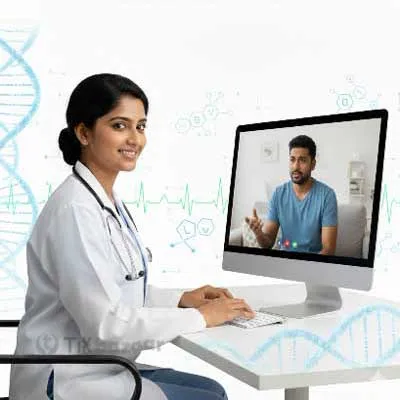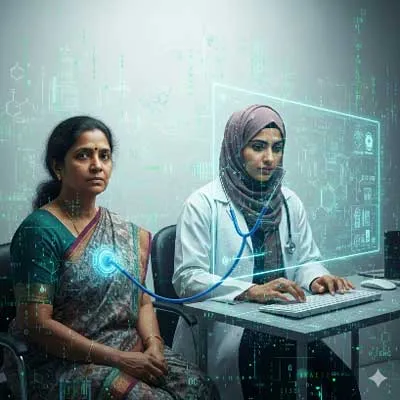ആരോഗ്യ മേഖലയിലെ ഡിജിറ്റൽ വിപ്ലവം: മികച്ച 5 ബിസിനസ് സാധ്യതകൾ
- January 15, 2026
- vmsadiq

ഇന്നത്തെ തിരക്കേറിയ ജീവിതശൈലിയിൽ ഹോസ്പിറ്റലിൽ പോയി മണിക്കൂറുകളോളം ക്യൂ നിൽക്കാൻ ആർക്കും താല്പര്യമില്ല. ഇവിടെയാണ് ഡിജിറ്റൽ ഹെൽത്ത് കെയർ സൊല്യൂഷനുകളുടെ പ്രസക്തി. കുറഞ്ഞ ചിലവിലും വേഗത്തിലും മികച്ച ചികിത്സാ സഹായങ്ങൾ ലഭ്യമാക്കുന്ന ചില ബിസിനസ് ആശയങ്ങൾ നോക്കാം.
1. ടെലിമെഡിസിൻ പ്ലാറ്റ്ഫോമുകൾ (Telemedicine Apps)
വീട്ടിലിരുന്ന് തന്നെ ഡോക്ടർമാരെ കണ്ട് സംസാരിക്കാൻ സഹായിക്കുന്ന പ്ലാറ്റ്ഫോമുകൾക്ക് വലിയ സാധ്യതയുണ്ട്.
Video Consultation: വീഡിയോ കോളിലൂടെ രോഗലക്ഷണങ്ങൾ ഡോക്ടറോട് വിവരിക്കാനും മരുന്നുകൾ കുറിച്ചു വാങ്ങാനുമുള്ള സൗകര്യം.
Specialist Access: ഗ്രാമപ്രദേശങ്ങളിലുള്ളവർക്ക് നഗരങ്ങളിലെ സ്പെഷ്യലിസ്റ്റ് ഡോക്ടർമാരുടെ സേവനം ഇതിലൂടെ ലഭ്യമാക്കാം.
2. ഹോം ഹെൽത്ത് കെയർ സർവീസസ് (Home Healthcare)
വൃദ്ധർക്കും ദീർഘകാല രോഗികൾക്കും വീട്ടിൽ വന്ന് പരിശോധനകളും പരിചരണവും നൽകുന്ന രീതിയാണിത്.
Digital Booking: ആപ്പുകൾ വഴി നഴ്സുമാരുടെയോ ലാബ് ടെക്നീഷ്യന്മാരുടെയോ സേവനം ബുക്ക് ചെയ്യാം.
At-home Lab Tests: രക്തപരിശോധനയും മറ്റും വീട്ടിൽ നിന്ന് തന്നെ ചെയ്ത് റിസൾട്ട് ഓൺലൈനായി നൽകുന്ന രീതിക്ക് ഇന്ന് ആവശ്യക്കാർ ഏറെയാണ്.
3. ഓൺലൈൻ ഫാർമസി (E-Pharmacy)
മരുന്നുകൾ ഓർഡർ ചെയ്താൽ ഡോർ സ്റ്റെപ്പിൽ എത്തിക്കുന്ന ബിസിനസ്.
മെഡിക്കൽ ഷോപ്പുകളിൽ നേരിട്ട് പോകാതെ പ്രിസ്ക്രിപ്ഷൻ അപ്ലോഡ് ചെയ്ത് മരുന്നുകൾ വാങ്ങാൻ വായനക്കാരെ സഹായിക്കാം.
കൃത്യസമയത്ത് മരുന്നുകൾ തീരുന്നത് ഓർമ്മിപ്പിക്കാനും (Refill Reminders) ആപ്പിൽ സൗകര്യം നൽകാം.
4. ഹെൽത്ത് & ഫിറ്റ്നസ് ട്രാക്കിംഗ് (Health Monitoring)

സ്മാർട്ട് വാച്ചുകളും മറ്റു വെയറബിൾ ഡിവൈസുകളും (Wearable Devices) നൽകുന്ന ഡാറ്റ ഉപയോഗിച്ച് ആളുകളുടെ ആരോഗ്യം മെച്ചപ്പെടുത്താൻ സഹായിക്കുന്ന ആപ്പുകൾ.
Diet & Wellness Coaching: വ്യക്തിഗതമായ ഡയറ്റ് പ്ലാനുകളും വ്യായാമ മുറകളും നിർദ്ദേശിക്കുന്ന ഡിജിറ്റൽ പ്ലാറ്റ്ഫോമുകൾ.
Mental Health Apps: കൗൺസിലിംഗ്, മെഡിറ്റേഷൻ, സ്ട്രെസ് മാനേജ്മെന്റ് എന്നിവയ്ക്കായി പ്രത്യേക ആപ്പുകൾ തുടങ്ങാം.
5. ഡിജിറ്റൽ ഹെൽത്ത് റെക്കോർഡ്സ് (Digital Health Records - EHR)
രോഗികളുടെ ചികിത്സാ വിവരങ്ങൾ, സ്കാനിംഗ് റിപ്പോർട്ടുകൾ, ലാബ് റിസൾട്ടുകൾ എന്നിവ പേപ്പർ ഫയലുകൾക്ക് പകരം ഡിജിറ്റലായി സുരക്ഷിതമായി സൂക്ഷിക്കുന്ന സംവിധാനം. ഡോക്ടർമാർക്കും രോഗികൾക്കും ഒരുപോലെ ഉപകാരപ്പെടുന്ന ഈ സാങ്കേതികവിദ്യ വലിയൊരു ബിസിനസ് സാധ്യതയാണ്.
ഡിജിറ്റൽ ഹെൽത്ത് ബിസിനസ്സിൽ ശ്രദ്ധിക്കേണ്ടവ:
Data Privacy: രോഗികളുടെ വിവരങ്ങൾ അതീവ രഹസ്യമായി സൂക്ഷിക്കണം. മികച്ച സെക്യൂരിറ്റി സിസ്റ്റം ഉറപ്പാക്കുക.
Trust & Credibility: അംഗീകൃത ഡോക്ടർമാരെയും ലാബുകളെയും മാത്രമേ പ്ലാറ്റ്ഫോമിൽ ഉൾപ്പെടുത്താവൂ.
User-Friendly Design: പ്രായമായവർക്കും പെട്ടെന്ന് ഉപയോഗിക്കാൻ കഴിയുന്ന ലളിതമായ ആപ്പ് ഡിസൈൻ ആയിരിക്കണം.
ഉപസംഹാരം:
ആരോഗ്യ മേഖലയിലെ ഡിജിറ്റൽ മാറ്റങ്ങൾ ബിസിനസ് എന്നതിലുപരി ഒരു സാമൂഹിക സേവനം കൂടിയാണ്. ആധുനിക സാങ്കേതികവിദ്യയെ ശരിയായ രീതിയിൽ ഉപയോഗപ്പെടുത്തിയാൽ മികച്ച വരുമാനത്തോടൊപ്പം ലക്ഷക്കണക്കിന് ആളുകളുടെ ജീവിതം എളുപ്പമാക്കാനും നിങ്ങൾക്ക് സാധിക്കും.
